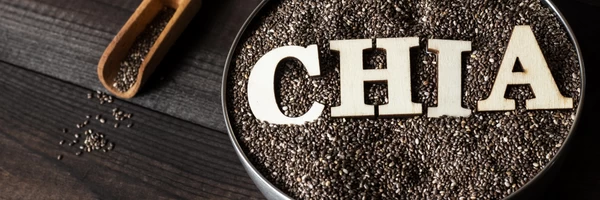
Chia seeds are small but are packed with healthy nutrients. Chia seeds are an incredible source of antioxidants, minerals, fiber, and omega-3 fatty acids. These seeds support bone health, heart health, and improve blood sugar levels. Nutritional facts of chia seeds per 2 tablespoons (28 grams):
|
Calories |
138 |
|
Protein |
4.7 grams |
|
Fat |
8.7 grams |
|
Alpha-linolenic acid (ALA) |
5 grams |
|
Carbs |
11.9 grams |
|
Fiber |
9.8 grams |
|
Calcium |
14% of RDI |
|
Iron |
12% of RDI |
|
Magnesium |
23% of RDI |
|
Phosphorus |
20% of RDI |
|
Zinc |
12% of RDI |
|
Vitamin B1 |
15% of RDI |
|
Vitamin B3 |
16% of RDI |
Chia seeds are a good source of fiber, protein, healthy fats, antioxidants, and various micronutrients. Some potential health benefits of chia seeds include:
May help with weight loss: Chia seeds are high in fiber, which can help you feel full and eat less.
May improve heart health: Chia seeds contain alpha-linolenic acid, an omega-3 fatty acid that can help lower blood pressure and reduce inflammation.
May benefit diabetes management: Chia seeds can help slow down the absorption of carbohydrates, which can help improve blood sugar control.
May improve bone health: Chia seeds are a good source of calcium, phosphorus, and other micronutrients that are important for bone health.
May improve skin health: The antioxidant content in chia seeds may help protect the skin from damage caused by UV rays, pollution and other environmental stressors.
It's important to note that more research is needed to confirm these benefits. And adding chia seeds to your diet should be done as a part of a balanced diet and under the guidance of a qualified healthcare professional.
Chia seeds are a highly nutritious food, but they do have a few downsides to consider. One potential downside is that they can be difficult to digest if not properly prepared. Eating chia seeds dry or in large quantities can cause them to expand in the stomach, which can lead to discomfort or bloating. Additionally, chia seeds can also interfere with the absorption of certain medications, so it is important to consult with a healthcare professional before consuming chia seeds if you are taking any medications. Another downside is the cost, chia seeds are relatively expensive compared to other seeds or grains. Also, chia seeds are high in oxalates, which can cause kidney stones in people who are prone to them.